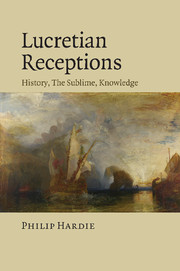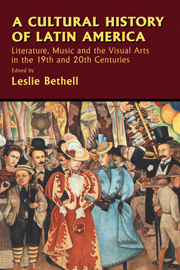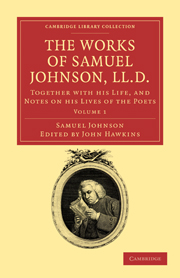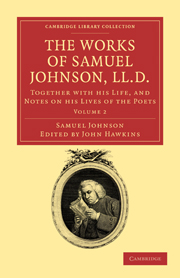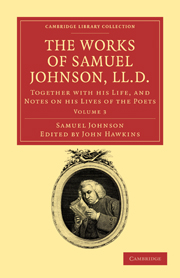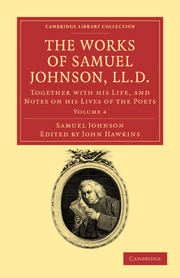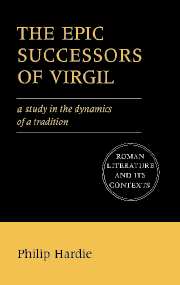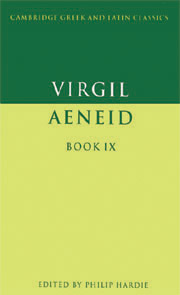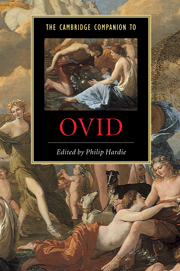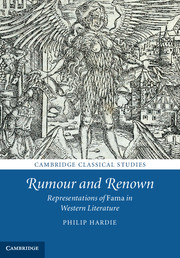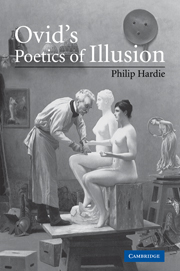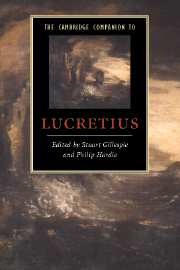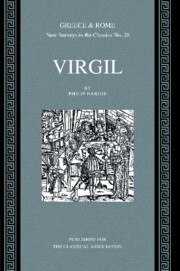Lucretian Receptions
History, the Sublime, Knowledge
$41.99 (C)
- Author: Philip Hardie, Trinity College, Cambridge
- Date Published: January 2015
- availability: Available
- format: Paperback
- isbn: 9781107485327
$
41.99
(C)
Paperback
Other available formats:
Hardback
Looking for an examination copy?
This title is not currently available for examination. However, if you are interested in the title for your course we can consider offering an examination copy. To register your interest please contact [email protected] providing details of the course you are teaching.
-
Lucretius' 'De rerum natura', one of the greatest Latin poems, worked a powerful fascination on Virgil and Horace, and continued to be an important model for later poets in antiquity and after, including Milton. This innovative set of studies on the reception of Lucretius is organized round three major themes: history and time, the sublime, and knowledge. The 'De rerum natura' was foundational for Augustan poets' dealings with history and time in the new age of the principate. It is also a major document in the history of the sublime; Virgil and Horace engage with the Lucretian sublime in ways that exercised a major influence on the sublime in later antique and Renaissance literature. The 'De rerum natura' presents a confident account of the ultimate truths of the universe; later didactic and epic poets respond with varying degrees of certainty or uncertainty to the challenge of Lucretius' Epicurean gospel.
Read more- Innovative study of central ancient Latin poets and of Milton, which will form a central item of bibliography for scholars and students working on Latin poetry
- All Latin and Greek in the main text is translated, making the book accessible to those without Latin or Greek expertise
- Includes essays on the history of the sublime which is currently an important topic in literary studies, increasing the range of readership
Customer reviews
Not yet reviewed
Be the first to review
Review was not posted due to profanity
×Product details
- Date Published: January 2015
- format: Paperback
- isbn: 9781107485327
- length: 318 pages
- dimensions: 230 x 151 x 16 mm
- weight: 0.45kg
- availability: Available
Table of Contents
Introduction
Part I. Time, History, Culture:
1. Cultural and historical narratives in Virgil's Eclogues and Lucretius
2. Virgilian and Horatian didactic: freedom and innovation
Part II. Sublime Visions:
3. Virgil's Fama and the Lucretian and Ennian sublime
4. The Speech of Pythagoras in Ovid Metamorphoses 15: Empedoclean epos
5. Lucretian visions in Virgil
6. Horace's sublime yearnings
Lucretian ironies
Part III. Certainties and Uncertainties:
7. Lucretian multiple explanations and their reception in Latin didactic and epic
8. The presence of Lucretius in Paradise Lost.
Sorry, this resource is locked
Please register or sign in to request access. If you are having problems accessing these resources please email [email protected]
Register Sign in» Proceed
You are now leaving the Cambridge University Press website. Your eBook purchase and download will be completed by our partner www.ebooks.com. Please see the permission section of the www.ebooks.com catalogue page for details of the print & copy limits on our eBooks.
Continue ×Are you sure you want to delete your account?
This cannot be undone.
Thank you for your feedback which will help us improve our service.
If you requested a response, we will make sure to get back to you shortly.
×
